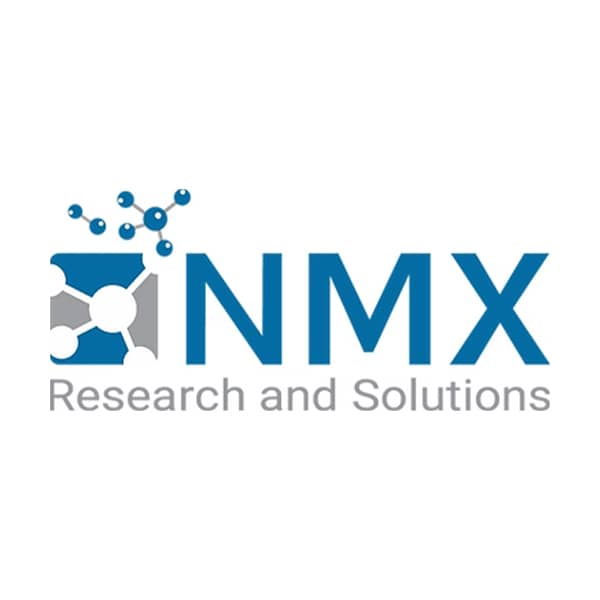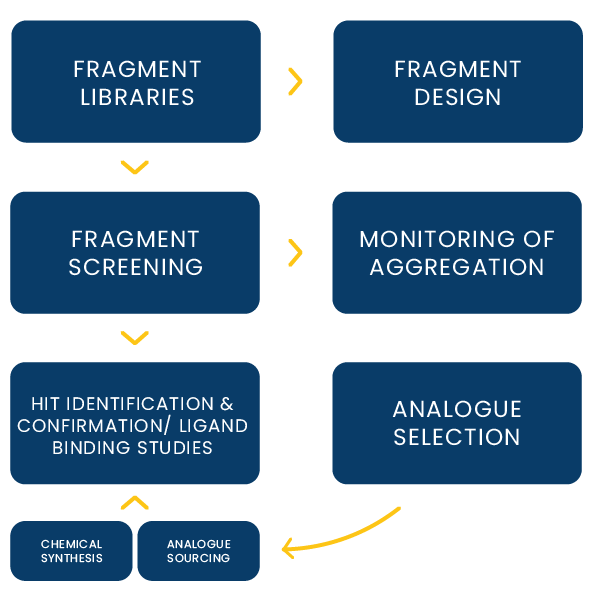fragment screening
NMX Research and Solutions has established a Fragment Based Discovery Platform, which combines Key Organics BIONET and NMX proprietary fragment collections with high-throughput biophysical screening technologies, to rapidly identify and characterize fragment hits. Applicable fragment libraries are screened against your target by 1H and/or 19F NMR and are ranked according to consensus binding between different NMR experiments. During follow-up singleton confirmation studies, binding scores are generated and are used to rank-order the hits by binding affinity.

Curated Fragment Libraries
Key Organics BIONET 1H and 19F fragment libraries and NMX proprietary fragment libraries have gone through rigorous cheminformatics filtering and exhaustive NMR curation to retain only well-behaved, non-aggregating, aqueous soluble compounds.
optimized pooling
Fragment libraries are screened as mixtures of fragments obtained by intelligent pooling to increase throughput, allowing for a streamlined evaluation of the binding of thousands of drug-like fragments to your target.
Singleton confirmation and ligad binding studies
Singleton confirmation studies carried out to validate hits obtained from fragment screening mirror the ligand binding studies offered by NMX. NMR binding studies may consist of a single NMR experiment but most commonly employ a consensus-based approach combining various NMR techniques. Compounds are ranked by binding scores that reflect binding affinity, and SAR by NMR may be used to guide medicinal chemistry efforts.
¹H Ligand-Detection
Analysis by ¹H NMR allows for a more exhaustive evaluation of binding, sample integrity , compound concentration and binding epitope.
¹⁹F Ligand-Detection
The highly sensitive fluorine atom allows for fast, background-free detection of a wide range of binding events.
Protein- Detected NMR
Higher affinity compounds can sometimes be missed by lingand-observed techniques. Monitoring protein fingerprints helps bridge te gap between ligand-detected NMR and other biophysical techniques, while keeping track of protein integrity.
Key Organics BIONET & NMX proprietary fragment libraries exclude fragments likely to form aggregates
The spin−spin relaxation Carr−Purcell−Meiboom−Gill (CPMG) NMR experiment has been employed to detect and remove aggregate species from Key Organics BIONET Premium and Fluorine fragment libraries and NMX proprietary fragment libraries [1].
Small molecules can self-assemble in aqueous solution into a wide range of nanoentity types and sizes (dimers, n-mers, micelles, colloids, etc.), each having their own unique properties. This has important consequences in the context of drug discovery including issues related to nonspecific binding, off-target effects, and false positives and negatives. The spin−spin relaxation CPMG NMR experiment is sensitive to molecular tumbling rates and can expose larger aggregate species that have slower rotational correlations. The strategy easily distinguishes lone-tumbling molecules versus nanoentities of various sizes. The technique is highly sensitive to chemical exchange between single molecule and aggregate states and can therefore be used as a reporter when direct measurement of aggregates is not possible by NMR.
Fragment hits & SAR by catalogue
Key Organics can certainly help regarding following up on any hits, whether that is via SAR by catalogue, where we can search BIONET and commercial space for analogues of compounds of interest or via custom or contract synthesis. For those analogues available through other vendors, we can offer a compound management service to provide the following services:
- Compound Procurement
- Compound Weighing
- Compound Dissolution
- Automated Reformatting & Plating
- Compound Shipping & Logistics to in-house & partner testing laboratories
- Quality Control
From hit to lead with key organics


What Do We Do
Browse More Services
An overview of how Key Organics can be your solution provider.
Price competitive global leaders in fee-for-service synthetic organic chemistry provision.
Extensive experience in the development work required to take your project from gram to kilogram scale.
Carefully designed “three component” compound (E3 ligase binder, linker, protein-of-interest binder) to harness the cells endogenous waste disposal machinery.
Combining Key Organics/BIONET and NMX proprietary fragment collections with high-throughput biophysical screening technologies.
All your key compound management activities including compound procurement, receipt, storage, formatting and distribution needs.
We offer a range of chemistry, sales and marketing, and technology consultancy services that can be specifically tailored to your needs.
High-end analytical services and support for the pharmaceutical, agrochemical, petrochemical and allied industries.







